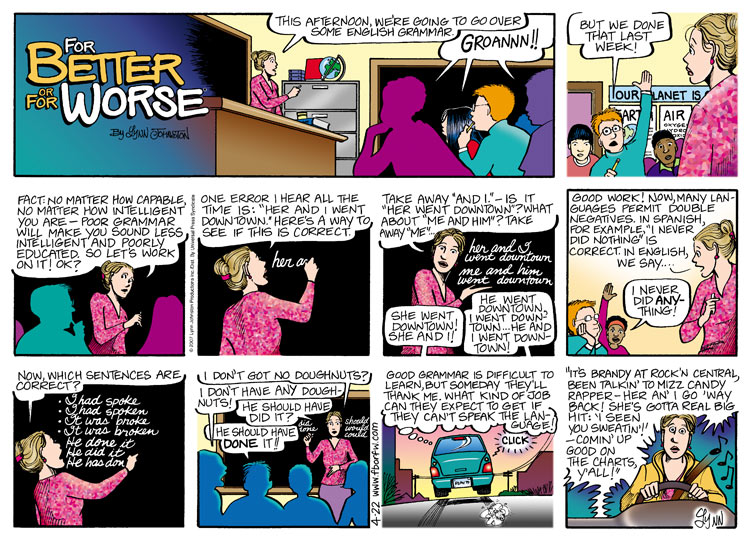April 22, 2007
Stiff upper lip, everybody...
So, I guess we have to offer up today's For Better Or For Worse for your contemplation (click for full size):
This cartoon evoked a wide range of reactions as I showed it around the Plaza, from howls and caterwauling to your basic resigned grimace. As has been noted by Sally Thomason and Roger Shuy, there is a sound sociological reason for warning students about disparaged features of nonstandard dialects, which the cartoon touches on in its third panel. And the "grammar" lesson isn't totally bad.
Our FBOFW teacher here shows a good awareness that the acceptability of "double negation" varies from language to language, for example, mentioning Spanish. But she reveals her fundamental ignorance when she goes on with "In English, we say...", as if negative-concord Englishes don't exist. Overall, the lesson is a prescriptivist nightmare, framed in the normative language of correctness and error, perpetuating the notion that there is such a thing as 'good grammar' that is 'difficult to learn'. If it had been presented just slightly differently--for example, as a description of some of the salient features of the dialect of English favored in professional or academic life--it would have been much more acceptable to me qua linguist, albeit still pretty sad.
But the thing that bothers me the most about the cartoon is not its depiction of blunt-weapon prescriptivism, which is surely unremarkable in a world of Strunk-and-White-educated English teachers. What kills me is the idea that, for 99.99% of the educated American public, this is what "grammar" is: a laundry list of half-remembered strictures against certain forms and usages, understood as commandments from on high about How To Do Right, not even dignified with a discussion of what the proscribed forms and usages actually are, grammatically speaking. Nonstandard irregular verb forms in the English perfect? Accusative (or 'object') pronouns appearing in nominative (or 'subject') position? The structural properties of negative polarity items like anything? The teachers don't know this stuff, let alone the students. All anyone knows is that He should have did it is "bad grammar", and must be avoided and looked down on, like pointing, farting, or scratching yourself in public. This stuff is not "English Grammar". At best, it's lessons in (Standard American) English Deportment and Etiquette. It is really, really demoralizing that almost nobody out there knows the difference.
Update:Alex Baumans writes in with the following observation:
I sympathise with your complaint on Language Log. In Dutch, such subjects aren't called grammar (or at least, they weren't when I studied them, but 'taalbeheersing', which translates loosely as 'language mastery'. Perhaps renaming them to 'language etiquette' or 'linguistic elegance' would put matters into perspective.
...and then with this further comment:
I don't know whether you're familiar with the sociolinguistics of Dutch in Belgium. To simplify broadly, up until the 1950s the vast majority of Dutch speakers only spoke their dialect, French being the language of culture. So in the Flemish emancipation movement, much stress was laid on having people acquire 'Standard Dutch', which was at the time called 'Algemeen Beschaafd Nederlands' of Standard Civilized Dutch. Civilised, (or 'cultured' being the operative word. This led to a very presciptivist approach, in which the stigma wasn't so much grammatical as social. If you used the wrong word or accent, you weren't accused of being ungrammatical, but of being uncouth and rural. On the other hand, acquiring the right sounds was seen as way towards social progress. All very professor Higgings and Eliza Doolittle.
I trained as a teacher of Dutch in the 80s, and by then there was a lot of debate about the prescriptivist approach. But this debate was only partly in terms of 'right & pure' vs 'wrong & debased' language (there was and is some of that). The main faultlines were sociological: the language of the people vs the language of the elite, regional authenticity vs cosmopolitan culture, centralised uniformity vs individual variety.
So the idea that you teach certain varieties of language because they are socially desirable, rather because it is inherently 'right' comes natural. In fact, that is the case for most Europeans, as we are very aware of the social implications of language.
I don't think that Americans are any less aware of the social implications of language than Europeans (otherwise people wouldn't care at all about 'He should have did it'). They've just conflated that notion with the notion of what 'grammar' is -- they use the word 'grammar' to refer to instruction in how to conform to the normal usage patterns of the prestige dialect, rather than to the study of the structure of language. Maybe it's a polysemy thing, and the word 'grammar' has come to have two meanings, one about getting standard usage right and one about studying the structure of language. But seems to me that in fact, a lot of Americans think that when they're learning about how to get usage right, they ARE studying the structure of language. And that is just a mistake.
Posted by Heidi Harley at April 22, 2007 06:56 PM